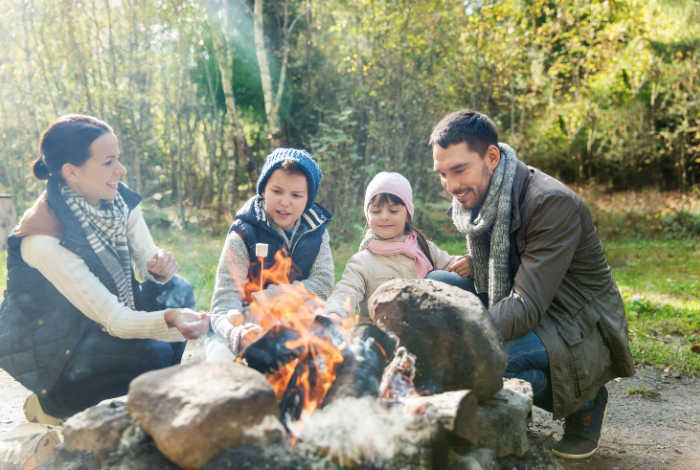Worried your child won’t warm up to summer camp? Here, top camp directors share secrets for helping shy kids step outside their comfort zone.
By Laura Quaglio
See Schedules for Top Summer Camps Near You >>
Tamar Hill, director and founder of the co-ed all-day sports camp Spartan Allstars (with locations in La Canada and Menlo Park, Calif.) agrees that most kids are quick to make friends at summer camp – even if they start the day hiding behind Mom. “I think ‘shy’ is something we tell our kids that they are,” says Tamar, who taught high-school biology for 16 years and served as a coach for the school’s women’s varsity basketball team. “Really ‘shy’ is an emotion, not an identity,” she says. “I think it’s a state of anxiety rather than a state of being.”
In fact, Tamar adds, most of us act a little “shy” in an unfamiliar setting, especially among complete strangers. She believes that it’s helpful to talk to our kids about why they’re feeling shy, nervous, or anxious about attending a particular camp or activity. By understanding their concerns, parents and camp staff may be better able to help that child feel at ease. And that, she says, is a much better solution than denying them all of the magical perks – emotional, social, physical, and academic – that summer camp offers.
Still a bit anxious? Remember that helping your child adjust won’t fall solely on your shoulders. Many camp directors and counselors really take pride in helping all children feel at ease, says CD Hullinger, owner of CD’s Kids Art Studio studios in San Jose. “When I get a shy kid, I immediately tell them that I am glad they are here because I need a helper,” she says. She asks these kids to hang out with her and let her know when they’re ready to participate. Once they warm up, she often has them, in turn, help befriend another camper who might be hovering at the fringe of a group activity. It’s a great way to encourage kids to make connections and to show children that they can make a difference in another child’s life.
Of course, these camp owners also have a few ideas of what parents can do to set the stage for a more successful start of summer camp. Here, a few of their top tips:
Get a Sneak Peek of the Camp
Summer camp websites often have class/camp descriptions, counselor bios, photos, and sometimes even videos of previous sessions. They may also have a Facebook page that shares highlights of special events and activities. Take some time to explore these sites with your child to familiarize them with the program. You can also ask the camp director if it’s okay to drop by during a session or if you can schedule a face-to-face meeting and a tour of the facilities. You can also request a more complete itinerary (if available) so your child will know exactly what to expect on a day-by-day and hour-by-hour basis. You could also sign up your child for a one-day drop-in session or an after school program at that camp. That way, when summer session begins, your child might already know some of the campers and counselors.
Ask What the Camp Does to Welcome Shy Kids
Rory says that his Adventure Camps program is set up to engage kids from the get-go. Before the campers even arrive at their first destination, they are greeted individually by counselors and are welcomed into “their” van – Great White, Snow White, or Cool Blue, which were given their names by the children. The fun starts as soon as the kids enter the van, which is not just a means of transportation but a great space for meeting new friends. By the time kids arrive at their first activity, any nervousness has usually disappeared.
Rory also tries to take kids’ interests into account. If one child is a fan of horses, Rory might bring outlines of ponies for that child to color … or the group might schedule a visit to the stable in Golden Gate Park. “We meet and greet each child by name, take an interest, and really pay attention to each one,” he says. “It’s the simplest thing, but that’s all it usually takes.”
Each camp director may have their own method of helping kids feel special. CD’s Kids Art Studio owner CD Hullinger has a “charming” secret that often works magic on apprehensive kids: “I have fused-glass trinkets that are small enough to fit in pockets,” she says. “I give one to the child and tell them that this little trinket is good luck! Usually by the first hour, they are hanging out and having fun.”
See Schedules for Top Summer Camps Near You >>
Sign Up Kids with a Buddy
If you know your child is truly hesitant to make new friends, our experts advise trying to sign them up with a friend.(ActivityHero makes this easy to do: Once you register, just share your registrations with the parents of your child’s friends.)
Also consider enrolling your child in multiple sessions at the same camp, especially if that location hosts an array of activities and programs. Spartan Allstars, for instance, offers sports camps, as well as ones with a drama theme. She does advise against over-scheduling your child for camps that are heavy on physical activity, though, because that can be exhausting, even for energetic kids. Try to break up those sports-camp weeks with something artistic or academic, for example.
Help Counselors Understand Your Child
If you have any concerns or helpful information about your child’s personality, behavior, interests, or special needs, share them with the camp’s staff before the session starts. For instance, let camp counselors or directors know if your child has been diagnosed with a condition such as an Asperger’s spectrum disorder or ADHD, if they have an aversion to something (such as getting wet or muddy), or if they’re afraid of something (such as dogs, heights, or clowns). You should also alert staff if something stressful is going on in your household, such as a recent move, the death of a loved one, or a divorce – or even if your child is just having a bad day or didn’t get enough sleep the previous night. The more information counselors have, the better they can help your child feel comfortable at camp.
Tamar adds that it’s important to remember that summer camps are not an extension of school, and many are not equipped to make the same accommodations as schools do. If your child needs a great deal of modifications, consider seeking out a camp that advertises an expertise in working with children who have special needs. Find out more about camps that serve kids with special needs.
Prepare for the First Day of Summer Camp
Day One at summer camp usually means plenty of paperwork, traffic snarls in the parking area, parents with questions, and very young siblings running around wreaking havoc as only toddlers can do. If your child is already anxious, all of this won’t help. That’s why Tamar suggests making an extra effort to start the first day of camp with a positive attitude. If you’re anxious or stressed, your kids will pick up on that, but if you’re calm, they’ll be more likely to mirror some of your happy-go-lucky approach. Try this pre-camp preparation strategy:
- A month before camp, clear your calendar for an hour before and after drop-off, so you won’t feel pressured during check-in. Also, make sure you’ve completed all of your camp forms. ActivityHero makes this easy, too, just go to My Registrations and you’ll see links to the forms that you need to complete, if there are any.
- The Friday before camp, re-read all of the camp handouts and emails. Double-check drop-off and pick-up times and all requirements for paperwork, medications, behavior, clothing, and supplies. Have questions? Ask now; don’t wait until registration, when the director and counselors have a million other things vying for their attention.
- The night before camp, lay out clothes and shoes, then pack lunches, backpacks, and gym bags with all necessities (including sunscreen, a water bottle, and a snack, for instance).
The morning of camp, if possible, carpool with your child’s camp buddies – or arrange to arrive at the same time so your child won’t have to walk in alone. - On the ride to camp, stay calm. Don’t stress about traffic or ask “Are you nervous?” or “Will you be okay?” Turn on some fun music, and chat about one of your child’s interests (such as a favorite TV show) during the drive.
- When you arrive at camp, expect a significant wait time. Even at the most organized camps, it may take up to an hour to pass out T-shirts, introduce counselors, collect paperwork and payments, and the like. “If you lower your expectations, you’ll never be disappointed,” says Tamar. And if the process goes quickly, you’ll be pleasantly surprised.
Say a Quick Goodbye … Then Leave
At the start of the camp session, some parents would like to hang out and watch for a while to make sure their child is okay. While Tamar doesn’t mind, she says that lingering in the background may not be the best approach with anxious or clingy kids. “Half the time when parents do that, the kids are looking for them all the time,” she says. Instead, once your child is transitioned to the care of the counselors, it’s time to head out.
If you really don’t love the idea of being out of the loop during your child’s day, ask the camp director if there is anything in place to help you stay connected or informed. For instance, Spartan Allstars has partnered with Kinderlime, which offers apps for parents that allow them to view photos taken at camp and uploaded throughout the day.
Tamar adds that sometimes kids are less likely to try to manipulate an early pickup if they know Mom or Dad has plans for the day. She advises saying something like, “I’m really busy at work, so I can’t come and take you home, but if there is an emergency, the camp knows how to contact me.”
Generally, says Tamar, kids are happily participating within 5 minutes of beginning their first Spartan Allstars activity. So try to forget about the waterworks that your child turned on during drop-off. Believe it or not, Tamar says that kids who start out “kind of hiding behind their mom” are usually the ones who become the most attached to counselors and other campers throughout the week. “They break out of it really quickly,” she says. “Most kids do.”
Rory agrees, saying that – 9 times out of 10 – even the most distraught kids are fine before the parents leave the parking lot. In particular, he remembers a 4-year-old girl who came to his camp feeling excited but also very nervous. As the day progressed, he noticed she was participating and smiling, so he joked with her. “At one point I said, Are you okay? I can call your mom … and I reached into my pocket and pulled out a banana and put it up to my ear,” says Rory. “She just started cracking up. Her mom said she never stopped talking about that.” Sixteen years later, that girl is now one of Rory’s camp counselors.
Don’t Let Problems Fester
If you or your child has a concern about something that happened at camp, share it with the camp director right away, says Tamar. It’s often easier and more effective to mediate a problem in its early stages (especially if it’s a social one). And allowing more time to pass generally leaves parents and kids growing more frustrated and upset each day.
“We don’t want any child to have a bad experience,” agrees Rory. “We want every kid who comes to Adventure Camps to really love it. For them to be safe and have a fun time and go home feeling great about who they are.” Your calm and honest feedback can help ensure that this happens at your child’s summer camp sessions.
And Don’t Forget to Share Praise, Too!
“Parents often don’t say anything if they’re happy,” says Tamar. One year, she received complaints (but no positive remarks) about a “color run” type of activity, in which kids get powdered from head to toe with colored cornstarch. The kids loved it, but the negative feedback caused her to nix the event the following session … only to have many families beg for its return. (She reinstated the event, but now allows kids to opt out if they don’t want to wind up with hair that’s temporarily pink and blue.)
Also spread the word to other parents about what makes your favorite camps special, including the ways that they helped your child feel at ease. Of course you probably already offer this info to friends and family. But for a greater impact, take just a few minutes (literally) to write a positive review right on ActivityHero. It’s a great way to show your gratitude to a special counselor or camp director – and it might help another family find a new favorite summer camp for their shy or not-so-shy child.



















